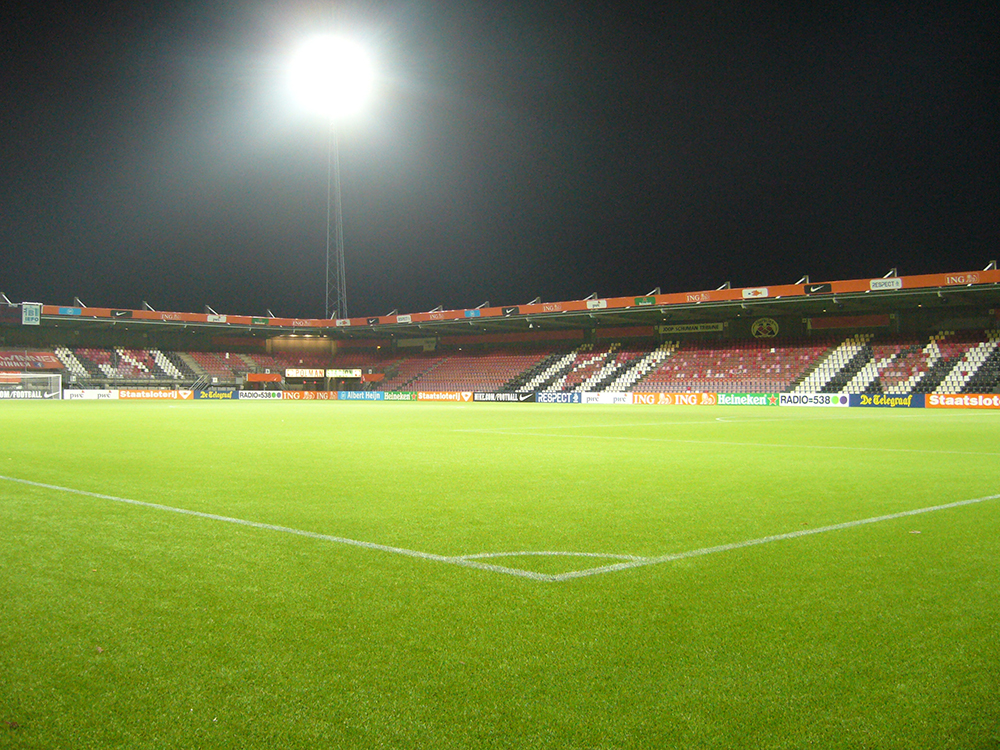
Welcome to Vitality Stadium, home of AFC Bournemouth, one of the most advanced football clubs in England. The stadium, which is located in the heart of Dorset, has played an important role in the club’s expansion and success over the last decade. Vitality Stadium has been the cornerstone of AFC Bournemouth’s narrative, from humble beginnings to Premier League success. This article will look at the stadium’s history, Bournemouth’s early years, the club’s ascent to prominence, and the significance of Vitality Stadium. We’ll also look at the club’s prospects for becoming a big power in English football.
So, join us as we investigate the link between Vitality Stadium and Bournemouth.
History of the Stadium
Vitality Stadium, you’ve been around for a while now, having opened in 1910 as Dean Court, and it’s apparent you’ve been an important part of Bournemouth’s history ever since. You’ve been used for football matches since the beginning, with Bournemouth & Boscombe Athletic Football Club playing its first game at the stadium in 1910. You’ve also been utilised for other sports like hockey and athletics over the years, and you even had a greyhound racing track until 1932. Your appearance has also evolved significantly throughout the years. You underwent substantial reconstruction in 2001 and now have a capacity of 11,360
This expanded further in 2014 when two more stands were added. The Steve Fletcher Stand, named after the record-breaking Bournemouth player, and the Ted MacDougall Stand were among them. The Vitality Stadium is rocking, with fans from both the home and visiting sides filling the stands. Your facilities are also excellent, with a large variety of food and beverages available. There is also the Bournemouth FC Club Shop, where fans may purchase official goods.
You are not just used for football matches, but also for music concerts, conferences, and other activities. This has helped to place Bournemouth on the map, bringing in a continuous influx of tourists and visitors. You’ve become a fixture in the local community, and fans from all over the world flock to see you perform. You’ve been a part of Bournemouth’s history for over a century, and it’s apparent that you’ll play a key role in the town for many years to come
Bournemouth’ Early Years

ou are advised to learn about the town of Bournemouth, its history, and its rise to become a popular tourist and local attraction. Bournemouth, on England’s south coast, has a population of around 183,000 people. Since its inception, the town has been linked to the sea, with the first settlements dating back to the Iron Age. The town began to grow rapidly in the nineteenth century, thanks to an influx of visitors who wanted to take advantage of the moderate climate and natural beauty of the surrounding area. This expansion resulted in the construction of the famed Bournemouth Pier and the iconic Bournemouth Pavilion, from which tourists could enjoy stunning views of the English Channel.
Bournemouth had become a successful seaside resort by the end of the nineteenth century, with the construction of several great hotels and the opening of attractions such as the Bournemouth International Centre and the Bournemouth Aquarium. The town was also the site of England’s first purpose-built football stadium, Vitality Stadium, which opened in 1910. This stadium was the country’s first of its sort, and it was originally used for football and rugby events. It also served as a venue for international sporting events, concerts, and other forms of entertainment. The stadium has been refurbished multiple times and now serves as the home of the football club AFC Bournemouth as well as other sports teams. The famed Bournemouth Pier and the landmark Bournemouth Pavilion, from which guests may enjoy the stunning views.
Bournemouth has continued to thrive and attract more visitors in recent years. It is today a popular tourist and local destination, with a diverse selection of activities and attractions. It is also home to the well-known Bournemouth Pier and the landmark Vitality Stadium, which remains a key draw. Bournemouth has a rich history and a distinct culture that has grown over time. It’s a wonderful place to visit and explore, with something for everyone. Bournemouth has something for everyone, whether you want a peaceful vacation or an adventurous experience. There’s something for everyone, from beautiful beaches to the landmark Vitality Stadium.
The Club’s Rise to Prominence
AFC Bournemouth’s popularity has risen dramatically in recent years, propelling them to the top of England’s footballing hierarchy. After being created in 1899, the club spent the majority of its early years in obscurity, playing in the lower divisions and attempting to make a name for itself. Bournemouth did not have a reputation until the 2010s, when they were promoted to the Football League Championship in 2013 and subsequently to the Premier League in 2015. The club’s ascension was accompanied by a relocation to a brand-new facility, the Vitality facility.
The stadium, which opened in 2001, was originally called as Dean Court before being renamed in 2015. The new name matched the club’s new sponsor, Vitality, and the stadium received a slew of upgrades, including upgraded seats and a new restaurant. Since their promotion, the club’s success in the Premier League has only grown, with the team now sitting in the top half of the table. This success has been reflected in the club’s rising fans, with home fixtures at the Vitality Stadium often selling out.
In recent years, the stadium has also served as a regular venue for international matches, with several England matches taking place there. Bournemouth’s growth in the footballing world has been phenomenal, with the club rising from obscurity to become one of England’s most popular names. The Vitality Stadium has been at the core of this transition, serving as both a home for the team and a gathering place for its supporters. With the club performing well in the Premier League, it appears that Bournemouth and the Vitality Stadium are here to stay.
Vitality Stadium’s Role
Feel the stadium’s power and its connection to Bournemouth’s success story. Bournemouth Football Club plays their home games at Vitality Stadium, formerly Dean Court. It has served as a springboard for the club’s meteoric climb through the English football levels. The 11,329-seat stadium has become an important component of the club’s identity and a symbol of community pride. The stadium’s refurbishment and enlargement have been critical to the club’s success both on and off the play. It’s a gathering area for fans to cheer on their favourite team. It’s a place filled with passion, pride, and delight.
Supporters can see some of the most thrilling football in the English leagues from the stands. Off the pitch, the stadium is also a hive of activity. It hosts a wide range of events, from corporate gatherings to live music. It’s a terrific spot for families to have fun, and it’s also a popular tourist site. The club is committed to continuing to create an exceptional experience for those who attend the stadium. They’ve made significant expenditures in the stadium and its facilities, including a new cutting-edge pitch. This demonstrates their dedication to offering a high-quality experience for all visitors.
The stadium has come to symbolise Bournemouth’s success. It has played a significant role in the club’s climb to prominence and will do so for many years to come. It creates an environment unlike any other in the country, and it serves as a reminder of the remarkable trip the team has taken. Vitality Stadium is a special place with a special link to Bournemouth. Its significance to the club and the community cannot be overstated, and it has become a symbol of optimism and pride for everyone who have followed the team’s progress. Long may it serve as Bournemouth Football Club’s home.
The Future of Bournemouth
Bournemouth’s bright future can be seen as the club’s ascension through the English football tiers continues to win the hearts of many. The purpose-built Vitality Stadium in the middle of town is the most prominent manifestation of this success, giving the Cherries with a new home in 2001. The stadium is an important element of the town’s sporting environment as the team continues to make its mark in the Premier League. The stadium’s facilities, combined with the team’s excellent achievement, have helped to draw more supporters to the area, promoting local businesses and instilling pride in the community.
The stadium’s presence has also had an impact on the local housing market, with property values rising due to increased demand in the area. Bournemouth’s future looks promising, with ambitious plans to enlarge the stadium and create more exciting options for football fans. This includes the introduction of a new club shop and museum, and the potential for further development of the surrounding area. The team itself is looking to build on its recent league successes, with the aim of establishing itself in the top half of the table.
This ambition, combined with the team’s ardent fans, will keep Bournemouth firmly on the football map. Bournemouth’s strong connection to football, as well as the presence of the Vitality Stadium, has given the town a fresh sense of identity and pride. With the rising popularity of football in the area and the stadium’s role in providing a home for the club, Bournemouth is certain to remain one of England’s top teams. It’s an exciting time for the community, with many years of prosperity and expansion ahead of it.
Conclusion
You’ve experienced the significance of Vitality Stadium in Bournemouth’s growth and success. The stadium has been an important part of Bournemouth’s journey from humble beginnings to being an established Premier League team. The stadium will remain an important part of Bournemouth’s story as the club grows. It’s been a fantastic ride thus far, and with the stadium at its heart, there’s a lot more to come.









